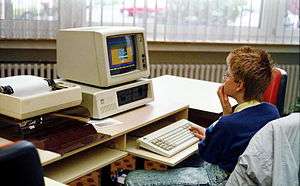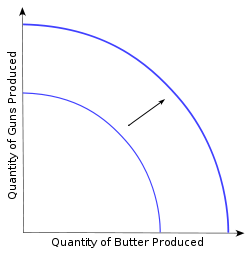Technological revolution
Technological revolution is, in general, a relatively short period in history when one technology (or better a set of technologies) is replaced by another technology (or by the set of technologies). As Nick Bostrom wrote: “We might define a technological revolution as a dramatic change brought about relatively quickly by the introduction of some new technology.” [1] It is an era of an accelerated technological progress characterized not only by new innovations but also their application and diffusion.
A difference between technological revolution and technological change[2] is not clearly defined. The technological change we could see as an introduction of an individual (single) new technology, while the technological revolution as a period in which more new technologies are adopted at the almost same time. These new technologies or technological changes are usually interconnected - as 3rd Kranzberg's law of technology says: "Technology comes in packages, big and small."[3]
Description : By Joseph C. Galisim



A new technological revolution should increase a productivity of work, efficiency, etc. It may involve not only material changes but also changes in management, learning, social interactions, financing, methods of research etc. It is not limited strictly to technical aspects. Technological revolution so rewrites the material conditions of human existence and also reshape culture, society and even human nature. It can play a role of a trigger of a chain of various and unpredictable changes.[4]
"What distinguishes a technological revolution from a random collection of technology systems and justifies conceptualizing it as a revolution are two basic features:
1. The strong interconnectedness and interdependence of the participating systems in their technologies and markets.
2. The capacity to transform profoundly the rest of the economy (and eventually society)."[5]
The consequences of a technological revolution are not exclusively positive but also not that negative :3 - for example, it can have negative environmental impact and cause a temporal unemployment (so called technological unemployment).
The concept of technological revolution is based on the idea (not unquestioned) that technological progress is not linear but undulatory. Technological revolution can be:
- sectoral (more technological changes in one sector, e.g. Green revolution, Commercial revolution)
- universal (interconnected radical changes in more sectors, the universal technological revolution can be seen as a complex of several parallel sectoral technological revolutions, e.g. Second industrial revolution, Renaissance technological revolution etc.)
The concept of universal technological revolutions is a key factor in the Neo-Schumpeterian theory of long economic waves/cycles[6] (Carlota Perez, Tessaleno Devezas, Daniel Šmihula and others).
History
The most known example of technological revolution was the Industrial revolution in the 19th century, the Scientific-technical revolution about 1950 - 1960, the Neolithic revolution, the Digital revolution etc. The notion of "technological revolution" is frequently overused. Therefore, it is not easy to define which technological revolutions having occurred during world history were really crucial and influenced not only one segment of human activity but had a universal impact. One universal technological revolution should be composed from several sectoral technological revolutions (in science, industry, transport etc.).
We can identify several universal technological revolutions which occurred during the modern era in Western culture:[7]
- 1. (1600–1740) Financial-agricultural revolution
- 2. (1780–1840) Industrial revolution
- 3. (1870–1920) Technical revolution (or Second Industrial Revolution)
- 4. (1940–1970) Scientific-technical revolution
- 5. (1985–present) Information and telecommunications revolution
Attempts to find comparable periods of well defined technological revolutions in the pre-modern era are highly speculative.[8] Probably one of the most systematic attempts to suggest a timeline of technological revolutions in pre-modern Europe was done by Daniel Šmihula:[9]
- A. (1900-1100 BC) Indo-European technological revolution
- B. (700- 200 BC) Celtic and Greek technological revolution
- C. (300- 700 AD) Germano-Slavic technological revolution
- D. (930-1200 AD) Medieval technological revolution
- E. (1340-1470 AD) Renaissance technological revolution
The potential future technological revolution
After 2000 there became popular the idea that a sequence of technological revolutions is not over and in the forthcoming future we will witness the dawn of a new universal technological revolution. The main innovations should develop in the fields of nanotechnologies, alternative fuel and energy systems, biotechnologies, genetic engineering, new materials technologies etc.[10]
Relation to "Technological revolution" and "technical revolution"
Sometimes the notion of “Technological revolution” is used for the Second Industrial Revolution in the period about 1900. But in this case the designation “Technical revolution” would be more proper. When the notion of technical revolution is used in more general meaning it is almost identical with technological revolution but technological revolution requires material changes in used tools, machines, energy sources, production processes. Technical revolution can be restricted to changes in management, organisation and so called non-material technologies (e.g. a progress in mathematics or accounting).
List of intellectual, philosophical and technological revolutions (sectoral or universal)

- The Upper Paleolithic Revolution: The emergence of "high culture", new technologies and regionally distinct cultures (50,000 - 40,000 years ago).
- The Neolithic Revolution (perhaps 13000 years ago), which formed the basis for human civilization to develop.
- The Renaissance technological revolution: The set of inventions during the Renaissance period, roughly the 14th through the 16th century.
- The Commercial Revolution: A period of European economic expansion, colonialism, and mercantilism which lasted from approximately the 16th century until the early 18th century.
- The Price revolution: A series of economic events from the second half of the 15th century to the first half of the 17th, the price revolution refers most specifically to the high rate of inflation that characterized the period across Western Europe.
- The Scientific revolution: A fundamental transformation in scientific ideas around the 16th century.
- The British Agricultural Revolution (18th century), which spurred urbanisation and consequently helped launch the Industrial Revolution.
- The Industrial Revolution: The major shift of technological, socioeconomic and cultural conditions in the late 18th century and early 19th century that began in Britain and spread throughout the world.
- The Market Revolution: A drastic change in the manual labor system originating in the South of the United States (and soon moving to the North) and later spreading to the entire world (about 1800–1900).
- The Second Industrial Revolution (1871–1914).
- The Green Revolution (1945-1975): The use of industrial fertilizers and new crops greatly increased the world's agricultural output.
- The Digital Revolution: The sweeping changes brought about by computing and communication technology, starting from circa 1950 with the creation of the first general-purpose electronic computers.
- The Information revolution: The massive economic, social and technological changes resulting from the Digital revolution (after 1960?).
See also
- Accelerating change
- Electrification
- Kondratiev wave
- Kranzberg's laws of technology
- List of emerging technologies
- Mass production
- Machine tool
- Mechanization
- Productivity improving technologies (historical)
- Technological change
- Technological unemployment
References
- ↑ Bostroam, Nick (2006): Technological revolutions: Ethics and Policy in the Dark, Nanoscale: Issues and Perspectives for the Nano Century, eds. Nigel M. de S. Cameron and M. Ellen Mitchell (John Wiley, 2007): pp. 129‐152.
- ↑ Derived from Jaffe et al. (2002) Environmental Policy and technological Change and Schumpeter (1942) Capitalism, Socialisme and Democracy by Joost.vp on 26 August 2008
- ↑ Kranzberg, Melvin (1986) Technology and History: "Kranzberg's Laws", Technology and Culture, Vol. 27, No. 3, pp. 544-560.
- ↑ Klein, Maury(2008): The Technological Revolution, in The Newsletter of Foreign Policy Research Institute, Vol.13, No. 18.
- ↑ Perez, Carlota (2009):Technological revolutions and techno-economic paradigms., in Working Papers in Technology Governance and Economic Dynamics, Working Paper No. 20, (Norway and Tallinn University of Technology, Tallinn)
- ↑ for example: Perez, Carlota (2009):Technological revolutions and techno-economic paradigms., in Working Papers in Technology Governance and Economic Dynamics, Working Paper No. 20, (Norway and Tallinn University of Technology, Tallinn)
- ↑ based on: Šmihula, Daniel (2011): Long waves of technological innovations, Studia politica Slovaca, 2/2011, Bratislava, ISSN 1337-8163, pp. 50-69.
- ↑ for example: Drucker, Peter F. (1965):The First Technological Revolution and Its Lessons.
- ↑ Šmihula, Daniel (2011): Long waves of technological innovations, Studia politica Slovaca, 2/2011, Bratislava, ISSN 1337-8163, pp. 50-69
- ↑ Philip S. Anton, Richard Silberglitt, James Schneider (2001): The Global Technology Revolution - Bio/Nano/Materials Trends and Their Synergies with Information Technology by 2015., RAND, ISBN 0-8330-2949-5
